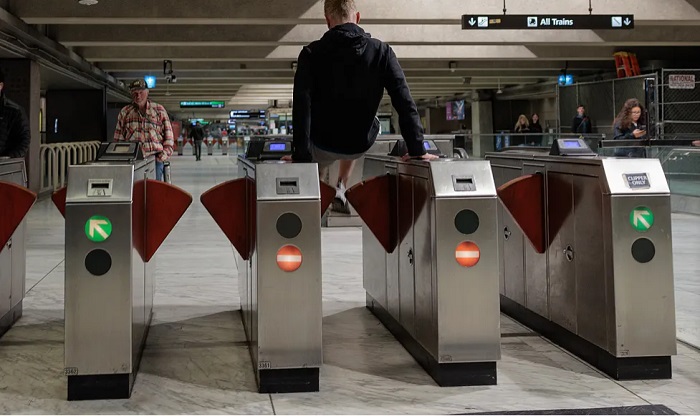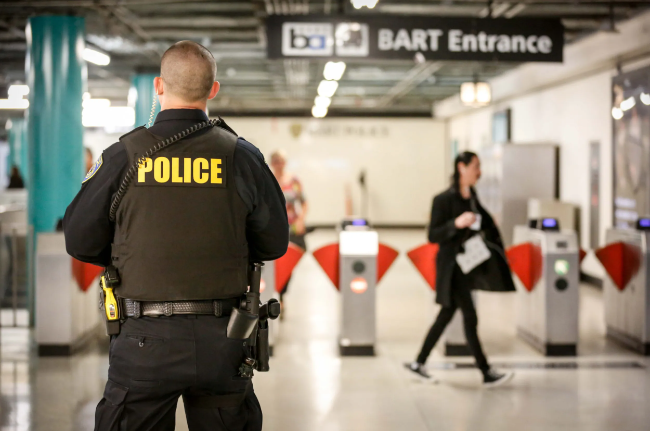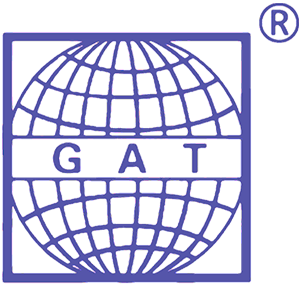BART officials made their feelings known about a California bill that would stop jailing people for skipping the fare on public transit, taking an opposing stance to the new legislation.
BART Rails Against Plan to Stop Jailing Repeat Turnstile Jumpers

The bill would stop categorizing repeat fare evasion as a misdemeanor crime. Currently, three or more subsequent fare evasions can be punished with imprisonment for up to 90 days. If the bill becomes law, the maximum punishment for recurrent fare evasion would be a fine of up to $400.
The bill passed overwhelmingly in the state Assembly and is currently awaiting a vote in the state Senate. Ultimately, Gov. Gavin Newsom would have to sign it into law.
The bill would likely have little impact on the way BART police address fare evasions, according to an internal BART memo seen by The Standard. Of the 1,800 citations issued for fare evasion in 2022, just 26 were associated with a misdemeanor.
However, BART’s Board of Directors voiced strong opinions on the bill, with opponents arguing it would worsen safety on the train network, making it more difficult for BART to address an upcoming budget shortfall and win back wary riders.
The board voted, in a 5-3 decision, to oppose the California bill on Thursday.
Director Debora Allen said the rise in violent incidents on BART is driving riders away. A May research poll found 85% of BART riders who have reduced or stopped using the trains said they would ride the system more if it were safer and cleaner.
“We need to figure out how to create an environment for our riders that they want to come to,” Allen said. “It seems to me we should be doing a lot more citation and crackdown on [fare evasion].”
The BART police union penned a letter to the system’s board and California lawmakers in June, stating that they oppose the bill.
“[The bill] would lessen the effectiveness of BART police officers by diminishing our ability to make it unattractive to those who repeatedly evade payment of fare,” the letter read. The department added that 80% of arrests made in the network were of riders who didn’t have proof of payment.

Board members who supported the bill mentioned its potential for equitable transit access.
Director Rebecca Saltzman said decriminalization would work in conjunction with BART’s current efforts to prevent fare evasion, such as hardening its stations and installing full height turnstiles.
“Ultimately, we want to make the system to deter fare evasion so that we’re not sending people to the criminal justice system in any way,” she said.
Saltzman added car drivers can receive multiple infractions without incurring a misdemeanor, and said the bill was a sensible measure to level the playing field between drivers and transit riders.
In recent years, BART has made efforts to address inequities in the way riders have been policed.
A 2021 report analyzing BART officers’ policing practices and behaviors, published by the Center for Policing Equity, found that Black riders represented 63% of all riders who experienced use-of-force from police, despite only being 9% of BART’s ridership.
The findings also showed that Black riders were eight times more likely to be stopped by police compared to white riders. Police stops were also more frequently conducted in high-poverty areas.
When the report was published, BART Police Chief Ed Alvarez said the department would rely on its findings to “fully ensure BART Police is engaging in equitable policing.”
Since 2018, BART has introduced crisis intervention specialists and fare inspectors that aren’t in uniform on its trains as an alternative to law enforcement to address non-threatening crimes and offenses. The number of uniformed BART police staff has dropped since 2019, the police union said.
BART officials agreed in June to add 50% more police staff to its network and raise officer salaries by 20%.
Mark Foley, the board’s vice president, voted to oppose the bill, criticizing it for being a “piecemeal attempt at a solution” to address transit equity. He said he would support legislation that would make transit free or low-cost for all riders, eliminating the need for fare evasion in the first place.
